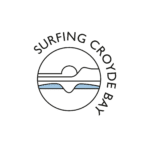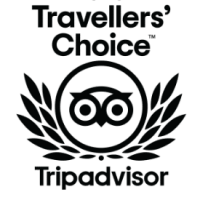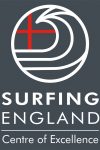learn to surf
Get the Best Introduction to Surfing with the Most Accomplished Surf School In Croyde, North Devon
expert tuition for beginners






Find out why Surfing Croyde Bay has been covered in The BBC, Vogue, The Independent, Airbnb, Carve Magazine, Surfing England. Add to that a whole host of 5 star TripAdvisor reviews, video tutorials, and surf blog insights you can rest assured you are in great hands. Come and learn to surf in Croyde, North Devon, you won’t regret it!
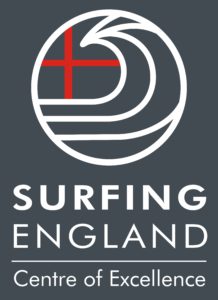
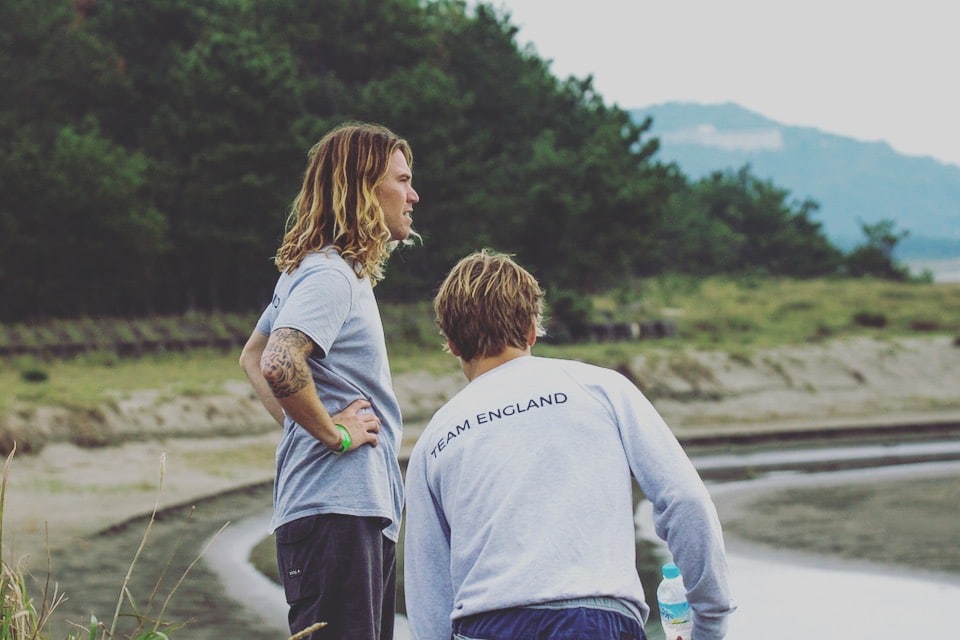
BEGINNER SURF LESSON
2.5 HOUR BEGINNER SURF LESSON-
ALL EQUIPMENT INCLUDED
-
2.5 HOUR LESSON
-
GROUP FORMAT
BEGINNER 3 LESSON PACK
3 x 2.5 HOUR BEGINNER SURF LESSONS-
ALL EQUIPMENT INCLUDED
-
3 LESSON DISCOUNT
-
GROUP FORMAT
BEGINNER PRIVATE LESSON
1 TO 1 BEGINNER SURF LESSON-
ONE TO ONE TUITION
-
MULTI LESSON DISCOUNT
-
PRIVATE FORMAT

Half Day Surf Lesson
Get a taster for surfing or improve your existing surf skills and technique with a half day lesson.

Full Day Surf Lesson
Immerse yourself in a full day of surf coaching with the surf school Surfing Croyde Bay . Make your experience a full day and maximise your progress.

Coasteering
See the coast like never before coasteering. Find out why it’s the UK’s fastest growing adventure sport.

Family Surf Lesson
Find out more about our family focused surf lessons, available for kids aged 5 years and upwards.

Learn To Surf
Learn to surf and ride your first wave with our award winning surf school. Benefit from surf lessons led and designed by England Surfing Head Coach Damon Beveridge.

Private 1:1 Surf Lesson
Get personalised attention and benefit from dedicated coaching from a your own personal surf coach.

Surf School
Find out more about what makes Surfing Croyde Bay an award winning centre of surfing excellence.

Surf Hire
Equipment makes a huge difference. Hire the latest equipment. Get the best advice on the right board or wetsuit for you.
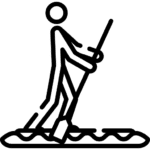
Stand Up Paddle
Get personalised attention and benefit from dedicated coaching from a your own personal surf coach.
Professional surf coaching, for beginners. We’ve taken everything we’ve learned from 20 years of surf coaching and applied it to your beginner surf lessons. Come and experience the Surfing Croyde Bay ethos: “Working on improving the standards of watersport instruction from beginner to expert in the U.K.”
SETTING THE BEST STANDARDS fOR BEGINNER SURFERS
Beginner surf lessons at Surfing Croyde Bay have been designed from the ground up to get you enjoying surfing from the get go.
Our beginner specific surfing packages have extra emphasis on getting you standing up, being safe and developing a strong foundation for your surfing development.
You will use a beginner specific surf board and work on everything from your pop up to your stance and handling your board. The smallest ratio of coach to student means you’ll get lots of personal attention and progress quickly.
Surfing Croyde Bay’s beginner lessons have been developed by Damon Beveridge, who has extensive coaching experience as the Team GB Head Coach.
Visit us and find out just how fun surfing can be, in a safe and secure environment. Develop your confidence as well as your surfing ability all under the guidance of an ISA qualified surf coach.
Book a single beginner surf lesson or book an immersive beginner surf course over several days.
Trip Advisor
Surfing Croyde Bay’s beginner surf lessons have 5 star Tripadvisor ratings. Our surf school is also rated #1 for Things To Do in Croyde.

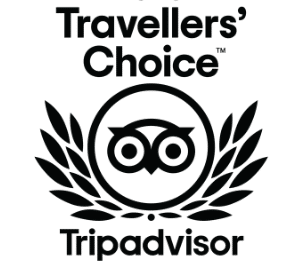

LEARN TO surf LESSONS
This half day surf lesson is in a group format and is ideal for beginner surfers. Specially designed for first time surfers you’ll learn in the basics of surfing with your instructor.
Unintimidating is the style of teaching, and any questions however basic are welcomed. Your instructor will also be a fully qualified lifeguard, so that you can relax and have fun exploring the sport of surfing.
We want you to enjoy surfing as much as we do, so whether you’ve never stood on a board before or have been doing it for years, we want to help you progress to your full potential.
FUN, SAFE, EXHILERATING
Here are just a few reasons why learning to surf with Surfing Croyde Bay is a great choice.
You will get the best surf tuition with the highest level of Surfing England instructors, who are all fully qualified lifeguards.
You’ll get lots of personalised 1:1 time with your instructor. We run the lowest instructor to student ratio of any Surfing England Centre of Excellence, guaranteed never to be greater than 6 students to 1 instructor.
Choose from beginner, family, private and corporate beginner surf lessons. Single lessons and multi-day courses. Once you improve you can move onto our intermediate surf courses too!
WE BELIEVE BEGINNERS NEED THE RIGHT EQUIPMENT TO PROGRESS
“Basically the board you’ll use is amazing for learning. The brilliance of the Softech board, is that you can progress to a standard where transitioning to a hard board isn’t as big a step as normal.”
Damon Beveridge – Director Of Surfing Croyde Bay
Softech are the world’s leading soft surf board company. Surfing Croyde Bay has teamed up with Softech to make your initiation into surfing a fun, exciting and memorable experience. You’ll take your surf lessons on a board that’s best for you. You’ll use high quality boards which are designed to be buoyant and super stable so first timers can easily catch and ride waves, and build the skills to start performing basic turns
YOU ARE IN SAFE HANDS

YOUR surf LESSON OPTIONS
Surfing Croyde Bay offers a variety of lesson options if you are learning to surf. You can choose from a single taster lesson or opt for several (2,3,4 or 5) discounted lessons. Each lesson is focused on getting you up and standing on your surf board. You will learn how to paddle, pop up, handle your board and enjoy the sport of surfing safely. All equipment is included in our learn to surf lessons.



Your Utimate Guide To Learning To Surf
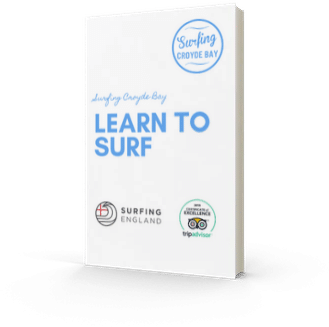
is surfing hard to learn?
Surfing is a challenging sport which can be tricky to learn, but with Surfing Croyde Bay, you’ll find the learning curve flattened out with expert coaching, tips and feedback to help you progress.
The good news is that simply standing up, on a foamy surfboard is relatively easy. On a scale of 1 to 10, it is probably a 3 or 4.
The key things you’ll need to master to get standing up are some balance, an understanding of basic technique, and where to catch the waves.
You will find that most surfers will say that the first part of learning to surf is pretty straightforward and very exhilarating.There are always different opinions from different people about how easy or hard a sport is to pick up. Trust us, most people are up and surfing in their first lesson.
The great thing about surfing is that once you’ve mastered standing up as a beginner, you really can call yourself a surfer! You will become part of the worldwide surfing population.
Surfing is a very accessible sport if you aged from 5 years and up there is a board you can learn to surf on. Surfing is a fantastic sport with a plethora of physical and mental benefits, for men, women and children of all ages. Get started now, who knows you might be the next Kelly Slater!
can you teach yourself to surf?
The basic answer is yes. But ask yourself, is teaching yourself the best way to learn to surf? No! For a start, different surf breaks have various hazards such as rips and rocks. It would be ill-advised to teach yourself to surf alone. Solely based on safety, let alone the adoption of bad habits.
If you don’t have access to a surf instructor, surf shop or surf school, then you can learn from other surfers in the water. Frankly, it’s not the best way. Your learning curve is going to be longer.
Getting help with surfing technique, selecting the correct type of board and understanding the ocean environment where you will learn to surf will all greatly benefit your experience and enjoyment. Surfing Croyde Bay always advise to take at least one surf lesson, you won’t regret it! We have intermediate surfers and advanced surfers who started with just one lesson.
how long does it take to become a surfer?
Learning the basics of standing up on a beginner foam surfboard takes between two hours and ten hours of surfing. The good news is that 80% of people learning to surf manage to stand up after just 2 hours of surfing.
If you still can’t stand up after ten hours of learning to surf, there’s something wrong; it may be your technique, your equipment or a lack of understanding.
The first step in learning to surf is practising lying down flat on a surfboard, paddling and balancing. Generally, this takes between 5 minutes and 20 minutes to accomplish.
The second step to learn to surf is paddling onto a broken wave or the white water. Again this can be accomplished in anything between five and twenty minutes.
The third step is the pop-up. The pop-up is the most technical and challenging part of learning to surf. When you are learning to move from the lying position to the standing position, you will fall off the surfboard a lot. The pop-up can take anything from 30 minutes to several hours, or even days to accomplish.
Once you’ve mastered these three steps, the great thing is, you’ll be a surfer! If you want to learn to turn the board or ride big waves it is going to take much more time. Nevertheless you’ll still be a surfer.
how can i get better at surfing. 15 tips to help you improve.
1. Take A Surf Lesson
Surfing looks easy, but it’s a challenging sport, and there can be hidden dangers from rocks under the water and rips. It is always advisable to take a lesson or get advice from a surfer friend who can spend time in the water with you. This way, you’ll avoid injuring yourself or even putting your life in danger.
2. Get A Good Qualified Surf Instructor
All surf schools and surf instructors aren’t equal. Make sure when getting a surf lesson that the surf school you choose is a surfing England accredited surfing centre. Check out the pedigree of the staff. At Surfing Croyde Bay we are lucky enough to have Surfing England Head Coach Damon Beveridge overseeing the operation. Remember a great surf instructor won’t just teach you how to surf; they’ll also inspire you and make you fall in love with surfing.
3. Use A High Volume Foamie Surfboard
Surfing is challenging to learn, so why make it harder for yourself by using the wrong equipment. Ideally, you will want a foamy surfboard, at least eight feet in length. Softech makes great boards that are ideal for learning on. A large board will offer you more flotation, more stability and will give you a far better chance of standing up and surfing.
4. Be Safe And Use A Surf Leash
Using a surf leash attached to your ankle means that you’ll remain connected to your surfboard even if you fall off. Your surfboard is your flotation device when you’re in the water, and it could save your life. Using a surf leash also protects other surfers from being hit by your board if you fall off. Use a surf leash, always!
5. Warm-Up Before You Get In The Water
Warmi up before you start to surf, it will get your heart rate up, warm up your muscles and get your body ready to hit the water. Warm-up exercises also help with your flexibility and can help you pop-up more effectively with the right technique.
6. Learn To Surf At The Right Surf Break
Mellow waves help give you the time to develop the necessary skills you need to learn to surf. Choose a beach where the waves are ideal for learning to surf, and you will find that your progression happens way faster.
7. Practice Your Surfing Technique On The Beach
Spend some time on the sand. Practice lying on your board and paddling then popping up. Also check your leash is secure and that you have wax on your board to help improve your grip on the board.
8. Watch The Waves Before You Get Into The Water
Before you make your way into the water, look at the waves and study them. See how and where they break. Keep your eye on the other surfers and see what they do. You should do this every single time before you go into the water, not just as a beginner surfer.
9. Develop Your Surfing Technique On Smaller Waves First
When you start surfing ride waves which are consummate to your experience level. Start on smaller waves and work your way up to more sizable waves. Remain within your comfort zone until you feel ready to tackle larger surf. Even though you may feel you can take on bigger waves, listen to the advice of your surf instructor. If they say you’re ready, go for it, if not keep working on your skills.
10. Give Experienced Surfers Some Space
Remember you’re learning a new sport and developing your skills. You wouldn’t race a car around a racetrack if you were learning to drive. You are going to make a lot of mistakes so give other surfers a wide berth. You won’t get in their way or worse still make them angry with you.
11. Practice Sitting On Your Board
Balancing on your surfboard while sitting is an essential skill you need to learn. Sitting on your surfboard allows you to rest and relax your back. Once you can paddle out past the whitewater, you will need to be able to sit on your surfboard while you wait to catch green waves.
12. Practice Your Pop-Up
The key to being able to practice your pop-up is wave count. You need to be paddling onto lots of waves so that you can catch them and then pop-up onto them. The fastest way to perfect your pop-up is to practice it over and over again. Practice your pop-up in the sea and on your surfboard on the shore.
13. Get Paddle Fit
There aren’t any shortcuts to getting paddle fit we’re afraid. Paddle, paddle and more paddling. The fitter you are, the faster you will be able to paddle, and the more waves you’ll catch. Keep your paddle strokes short and your elbows high for the best technique.
14. Avoid Nosediving
You nosedive when you catch a wave, and the front of your surfboard digs into the water, throwing you over the nose of the bord. Position yourself correctly on your surfboard, paddle down the wave and ensure you have plenty of momentum before popping up.
15. Don’t Forget To Have Fun!
The best surfer is the surfer having the most fun. Never forget this saying. If you live by it, you’ve got a lifetime of surfing enjoyment ahead of you!
is surfing dangerous?
If you compare surfing to skateboarding, snowboarding and other board sports, it merely isn’t as dangerous. In other land-based board sports when you fall you hit the ground, sometimes very hard. With surfing, you have the water to break your fall.
To put this in perspective, there are an average of 64,572 broken bones per year from skateboarding versus less than 1000 injuries per annum from surfing. If you consider that a sport is dangerous because you could be hurt surfing is 64 times less dangerous than skateboarding. If you compare surfing with a wide range of sport, most other sports have a higher rate of injury per 1000.
Mountain biking, motocross, kitesurfing, skiing, all have a higher injury risk per 1000 participants. So, as extreme sports go surfing is one of the safest.
can a beginner surfer use a shortboard?
Well, theoretically, yes, but it’s not a smart idea. If you want to get the most out of your time learning to surf, then you need to be on the right equipment. You need a board with buoyancy or float. A shortboard is not going to give you the best chance of catching waves and practising the surfing fundamentals: balance, co-ordination, pop-up etc.
You may think it looks cool, as you walk down to the sea with a shortboard under your arm. You don’t look cool though when you’re wallowing around in the whitewash trying to catch waves on your shortboard. Do yourself a favour and hire or buy a foamy.

